The Weight of the World: Examining Sacrifice in ‘Knock At The Cabin’
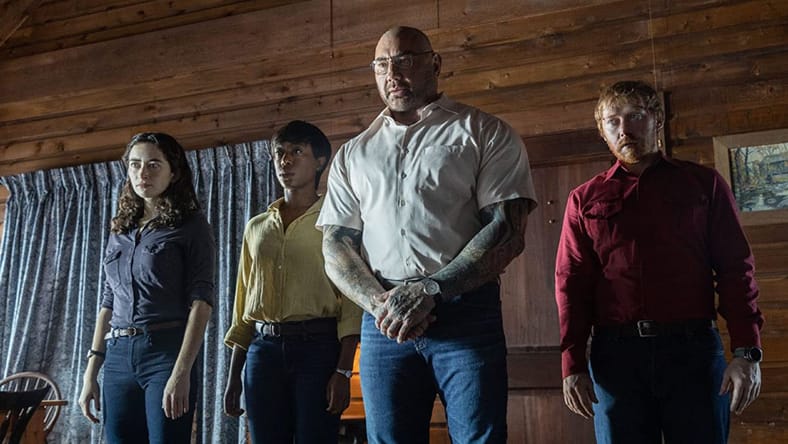
Spoilers ahead for M. Night Shyamalan’s Knock At The Cabin.
Paul Tremblay’s novel The Cabin at the End of the World definitely got under my skin. The story follows married couple Andrew and Eric as they vacation in a rural lake house with their daughter Wen. The titular knock shatters this peaceful retreat as four strangers carrying makeshift weapons demand that they choose one member of their family to die in order to prevent the apocalypse. As the oldest child of a religious family constantly asked to ignore abuse to maintain the status quo, I found the story’s central question to be exceptionally triggering. While I am in no way comparing my own struggles to that of a queer couple who have faced a lifetime of hatred and discrimination, I found myself growing more and more upset, not at the choice forced upon Eric and Andrew, but at the four invaders’ refusal to consider any other options.
The novel ends on an ambiguous note: Eric and Andrew refuse to sacrifice each other and the reader is left to decide if the world will indeed end because of their decision. M. Night Shyamalan’s adaptation, Knock at the Cabin, provides an answer to the thought experiment presented by Tremblay. Shyamalan’s Eric (Jonathan Groff) begs his husband to kill him in order to save the world for their daughter. Andrew (Ben Aldridge) reluctantly agrees and emerges from the woods with Wen (Kristen Cui) into a world that has been saved by Eric’s death.
To say that this ending has been controversial would be an understatement. With such a personal subject at its core, the film has generated a ferocious debate about Shyamalan’s ending with persuasive points on both sides. Many argue that the film depicts the sacrifices queer people must make to survive in a world built to discriminate. Some view it as a story centered on the “bury your gays” trope while others see a parable for the difficulty of raising children in the face of climate change.
Still, others will no doubt take the film’s message literally and interpret a biblical demand for the destruction of queer love. A great many people I love and respect have interpreted the ending in a variety of ways and while I understand the logic of these differing opinions, the story simply hits too close to home for me to change the way my heart responds.
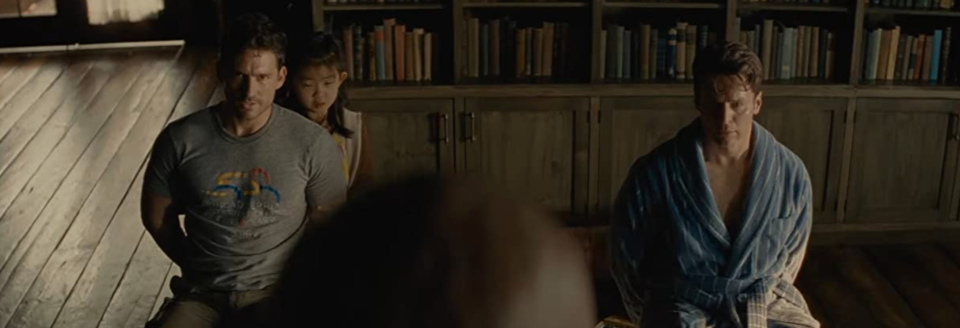
I wish I could interpret Knock at the Cabin as anything other than a story advocating for the destruction of non-traditional marriage. I wish I could listen to Shyamalan’s answers for why he made changes to the source material and hear anything other than a desire to please the audience. I wish I could subscribe to the interpretation that the film works if God is the villain. But the joy that surrounds Wen and Andrew as they mourn for Eric leads me to believe Shyamalan does not subscribe to that interpretation either. No matter how hard I try, all I can see at the end of Knock at the Cabin is yet another group of abusers getting away with their crimes. I see a continuance of the status quo unlikely to change.
I will not shame anyone for their interpretation as I know my issues with the film stem entirely from my own personal baggage. So rather than continue to tear each other down for our disagreements, perhaps we can look at what Knock at the Cabin can show us about the world we want. If the film is indeed a tragedy, what lessons can we take away from its conclusion? How can we use the strong emotions we feel when we watch the final frames to be better supporters of the people around us?
The film’s tagline commands us to “make the choice” and perhaps this is where we can start. The logical assumption is that this “choice” is the one presented to Eric and Andrew: would we be willing to sacrifice ourselves or someone we love to prevent the end of the world? This is a difficult and heartbreaking question to ponder, but there is another choice at the heart of the film. Shyalaman not only changes the film’s conclusion, but also the title. Rather than describe the cabin itself, Shyamalan’s Knock at the Cabin describes an action and gives us another choice to consider: should Leonard (Dave Bautista), Sabrina (Nikki Amuka-Bird), Adriane (Abby Quinn), and Redmond (Rupert Grint) make the choice to knock?
But first, let’s examine the concept of sacrifice. There is nothing inherently wrong with choosing to harm oneself in order to protect someone else. In fact, this selfless act of love is a fundamental piece of society. Parents sacrifice for their children every day. First responders, healthcare workers, and those in the military regularly sacrifice their safety and sometimes even their lives to protect their communities. These are necessary choices made to ensure a happy and healthy society and they are usually made out of necessity.
Danny Boyle’s film Sunshine presents a similar dilemma. On a mission to reignite the dying sun and save the world from a deadly winter, a group of astronauts realizes they do not have enough oxygen aboard the ship to reach their destination. One of them must die in order to complete the mission. While this sacrifice is indeed horrible, it is also inevitable and the cause of a tragic accident. If the astronauts choose not to act, life as we know it will inevitably cease to exist.
However, the sacrifice at the heart of Knock at the Cabin is not born out of necessity. The force commanding the four invaders to knock on the door is essentially holding the world hostage, threatening to cause biblical plagues and destruction if an arbitrary sacrifice is not made. Each time Eric and Andrew choose to keep living, the invading group kills one of their own.
The first to go is Redmond. Putting on a mask made of white mesh, reminiscent of a faceless majority, he kneels as the other three beat him to death. Leonard follows this action by turning on the TV and showing a world descending into chaos. Andrew makes much of the timing of this disaster, but there is another timeline to consider. The tsunamis do not occur until after the group kills Redmond. His death is viewed by the invaders as a necessity in the face of Eric’s and Andrew’s decisions. But if we are to reevaluate the premise of their demands, we could view this disaster as punishment for Redmond’s choices. Perhaps the invaders are being given four chances to resist a fear-based demand for innocent blood. If so, Redmond’s choice to harm an innocent family and then die by suicide is what actually triggers the end of the world.
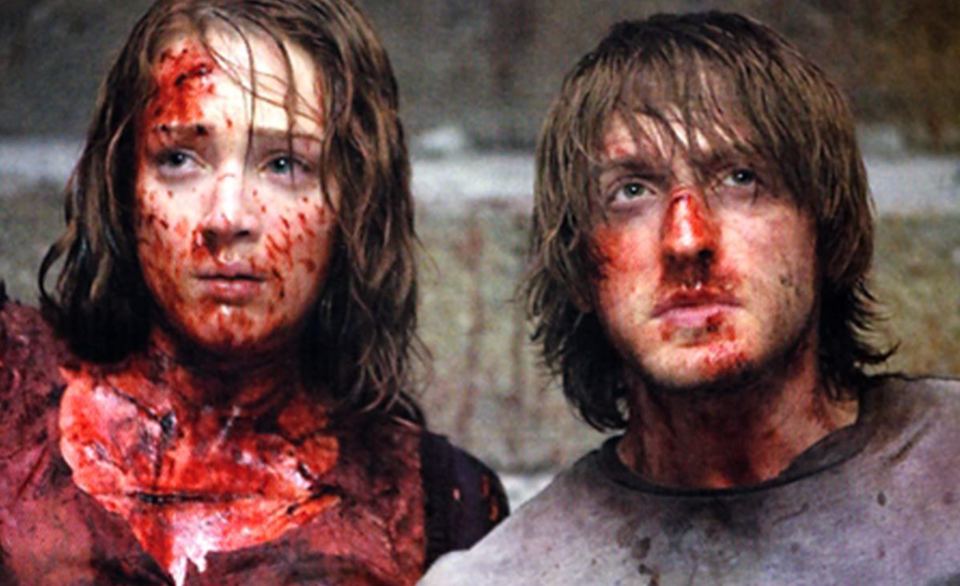
The sacrifice demanded of Eric and Andrew is similar to that of another horror movie set in an isolated cabin. The 2011 meta-slasher The Cabin in the Woods follows a group of five friends manipulated into becoming sacrifices for the “ancient ones,” a group of monstrous deities who threaten to rise and destroy the world if they are not treated to innocent blood on a regular basis. The film concludes with the two survivors choosing not to sacrifice themselves for the entertainment of a toxic system of power. When told that every human will die if he lives to see the sunrise, Marty (Fran Kranz) questions a world that would demand the pointless deaths of his friends. One would hope the four invaders would ask themselves a similar question: why would a god who demands innocent blood be worth worshiping? And by extension: am I accurately interpreting my god’s demands?
Though Eric and Andrew do consider their daughter in the equation, their sacrifice is similar to the arbitrary demands of submission that unfortunately occur in our society every day. Queer people are asked to keep their identities a secret for the comfort of a close-minded majority. Survivors of sexual assault are asked to ignore their abuse to avoid rocking the boat. Low-wage employees are asked to donate their sick days to support each other while CEOs continue to rake in millions. These are needless sacrifices demanded by those in power to maintain their dominance. The invaders do not present their ultimatum to Eric and Andrew in a bubble. They ask them to sacrifice themselves in a world that routinely demands pain from the less fortunate so that they can keep living a life built on the suffering of others.
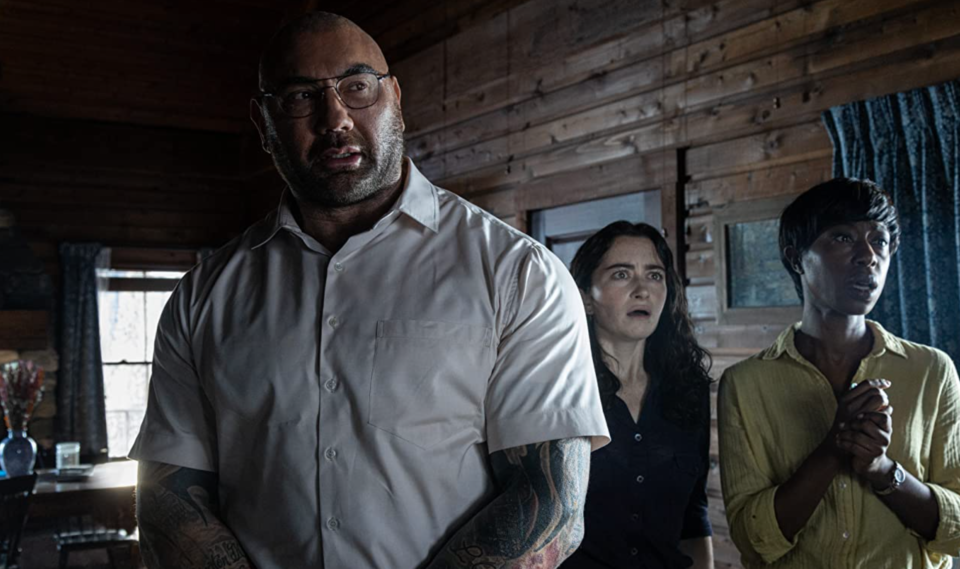
One of the many problems with this kind of sacrifice is that it is always asked of the same people. Once the invaders realize that Eric and Andrew are gay, they insist it has nothing to do with their mission. They give the same tired platitudes, telling the two men they have tied to chairs that they don’t have a homophobic bone in their body. While this may be true, they still continue with their attack. We see examples of the way the world has been cruel to Eric and Andrew because of their sexuality and Andrew tells them about a hate crime committed against him by Redmond. Leonard, Sabrina, and Adriane respond by feeling awful about it, then continuing on with their violent plan. They don’t ever consider the fact that maybe Eric and Andrew have already suffered enough.
The four invaders cite horrific visions as the driving force behind their actions. They describe watching the grisly apocalypse over and over, only finding relief in concrete steps toward their mission at the cabin. In an afterword to his novel, Tremblay describes their dilemma as a choice between love and fear. The four invaders claim to love Andrew, Eric, and especially Wen, but they let their fear consume this love and never consider the fact that they have a choice to make as well. They could choose to live with the visions, sacrificing their own happiness to protect the lives of Eric and Andrew. Perhaps learning to co-exist with these intrusive thoughts would be less of a sacrifice than the violent death they are asking of Eric and Andrew.
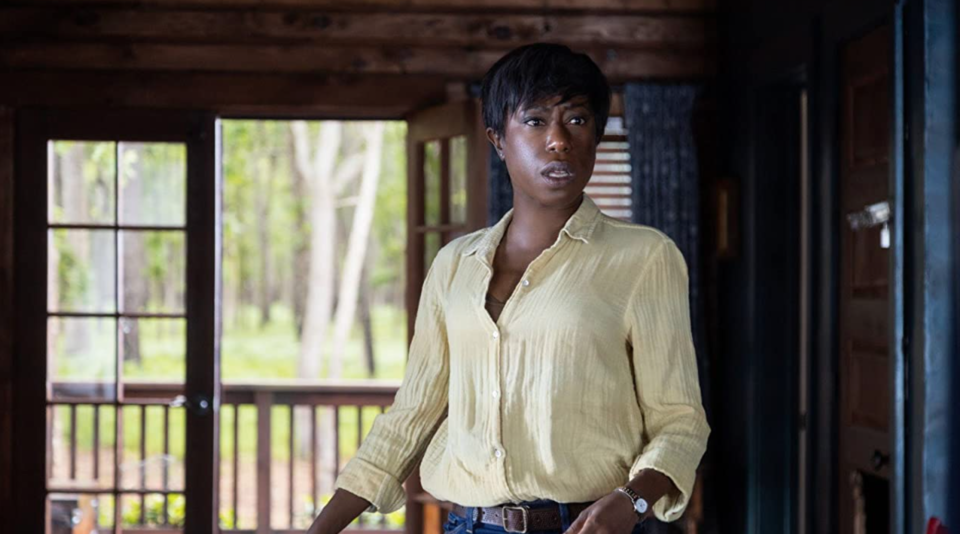
Shyamalan’s version of the story makes another significant change to Tremblay’s story: Sabrina does eventually choose to help Eric and Andrew escape. She decides that what she is asking them to do is wrong and vows to help the couple regardless of what happens to her. Though she does end up dying due to her visions, she has sacrificed her sanity and her life to protect two people targeted by fanaticism. It’s a sacrifice made out of love in spite of fear. She has rejected the forces commanding her to go against her own morality and made a choice that aligns with the person she wants to be.
Shyamalan’s film concludes with Leonard dying by suicide as the last sacrifice that triggers a reign of fire. Eric dies to save the world and humanity continues without knowledge of his sacrifice. Known for his twist endings, Shyamalan has given us perhaps the most predictable conclusion imaginable. A true twist would be for Leonard to survive the film, resisting the temptation to cut his own throat. The waters would recede and the clouds would part because he has finally made the choice to stop imposing his fear onto others. We would then understand a central premise hiding in plain sight since the film’s opening scene: it is wrong for a fearful majority to demand sacrifice from a marginalized community.
While reading, I longed for an overt condemnation of the invaders by anyone other than their victims. My version of the story would end with the deity they had been following telling the four invaders that THEY had failed his test. By giving into their fear and forcing a sacrifice from the innocent, THEY had caused the end of the world, not Andrew and Eric.

What’s so upsetting about the film’s conclusion is that no one who experiences the benefit of Eric’s sacrifice will ever know why. The world will continue as it was with only Andrew and Wen knowing what caused this miraculous reversal. The survivors will continue demanding sacrifices from the same people, perpetuating a zero-sum fallacy in which there is not enough love to go around. Eric’s death may have saved the world for Wen, but she is now doomed to a life of fear. Eric predicts that she will find someone to love her the way her fathers love each other, but should this love someday prove too pure or too challenging, a fearful majority may demand its destruction too.
When choosing not to die for a world that doesn’t care about him, Marty decides that maybe it’s time for someone else to have a turn. We’ve already seen centuries of humanity demanding sacrifice from othered communities. Perhaps it’s time to try a different way. Rather than choosing which of us should die to protect the rest from an arbitrary threat, maybe we should let a world built on the destruction of pure love burn down around us. Maybe the true lesson we can come away from Knock at the Cabin with is that we are each capable of making the choice not to knock.
Categorized: Editorials News
